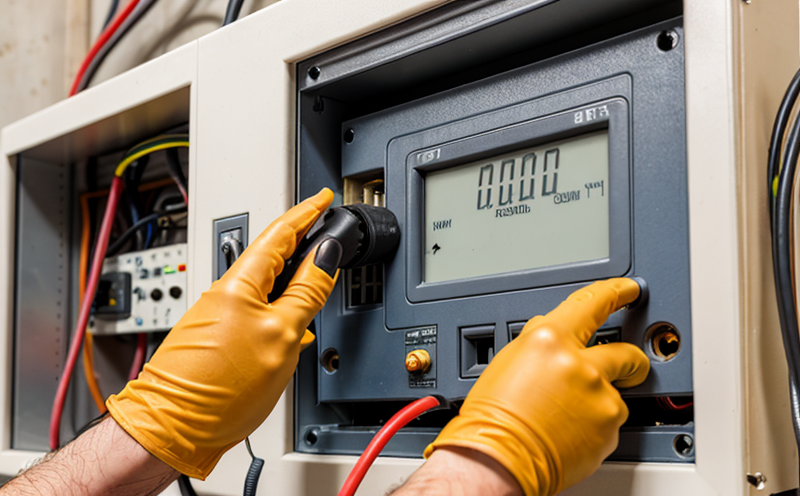BS EN 62620 Electrical Testing of Large Lithium-Ion Cells
The British Standard (BS) and European Norm (EN) standard EN 62620:2013, titled "Lithium-ion cells for rechargeable batteries - Electrical performance," defines the methodology for electrical testing of large lithium-ion cells. This service ensures that manufacturers, suppliers, and purchasers can assess the electrical characteristics of these cells in a consistent manner to ensure safety, reliability, and compliance with international standards.
The standard covers a range of tests including capacity measurement, internal resistance determination, charging, discharging, and impedance testing. Each test is conducted under controlled conditions that replicate real-world scenarios to provide accurate data on the cell's performance. For example, during capacity testing, the cell is fully discharged to a specified cut-off voltage before being recharged back to its full capacity.
Understanding the electrical behavior of these cells is critical for ensuring safe and efficient battery operation in various applications such as electric vehicles (EVs), renewable energy storage systems, and portable electronics. The standard ensures that all cells undergo rigorous testing prior to market release or integration into larger systems like hybrid cars or grid-scale batteries.
The BS EN 62620:2013 is recognized globally for its robustness in assessing the electrical performance of large lithium-ion cells, making it an indispensable tool for quality managers and compliance officers. This standard serves as a benchmark for the industry, ensuring that all participants adhere to high safety standards.
Our lab adheres strictly to this standard during our testing procedures. We use state-of-the-art equipment calibrated according to international guidelines to ensure accurate results every time. Our experienced engineers conduct each test meticulously and report findings promptly so you can make informed decisions about your products or services.
The benefits of complying with BS EN 62620:2013 extend beyond just meeting regulatory requirements; it also enhances brand reputation by demonstrating commitment to quality and safety standards. Compliance helps maintain trust among customers who value reliability in their energy solutions.
- Capacity measurement
- Internal resistance determination
- Charging procedures
- Discharging protocols
- Zener diode protection
- Fault current limiting
- Battery management system compatibility checks
We pride ourselves on providing comprehensive testing services that comply with the latest versions of this standard. Our team works closely with clients to understand their specific needs and tailor our solutions accordingly.
International Acceptance and Recognition
The BS EN 62620:2013 is widely accepted across Europe and internationally, reflecting its importance in the global battery industry. Many countries have adopted this standard as part of their national regulations or guidelines for lithium-ion cell testing.
Compliance with this standard can help companies avoid potential legal issues associated with non-compliant products entering markets where strict adherence to international standards is required. It also opens doors to new opportunities, particularly in regions like Asia-Pacific and North America, which increasingly demand stringent quality controls on imported goods.
Achieving compliance not only enhances your product’s marketability but also strengthens relationships with key stakeholders including customers, suppliers, and regulatory bodies. By demonstrating adherence to recognized international standards, you establish credibility within the industry and foster trust among all parties involved in the supply chain.
Environmental and Sustainability Contributions
The environmental impact of battery production cannot be overstated, especially considering the growing demand for electric vehicles and renewable energy storage systems. By ensuring that batteries meet stringent electrical performance standards like those outlined in BS EN 62620:2013, we contribute positively to sustainability efforts.
- Reduces waste generated during manufacturing processes
- Promotes recycling through clear understanding of cell behavior
- Makes efficient use of raw materials by optimizing design and performance parameters
- Encourages the development of safer and more durable products, reducing overall lifecycle emissions
Our commitment to sustainable practices doesn't end with testing; we also offer advice on how best to incorporate these principles into product development cycles. This includes recommending materials that minimize environmental footprint while maintaining necessary performance levels.
In summary, by adhering to BS EN 62620:2013 during our testing procedures, we play a vital role in promoting environmentally responsible practices throughout the battery industry.
Competitive Advantage and Market Impact
Complying with standards such as BS EN 62620:2013 provides several competitive advantages that can significantly impact your business's success:
- Better reputation: Demonstrating compliance enhances your company’s image, making it easier to attract customers and partners.
- Increased market share: Meeting these standards opens up access to larger markets where strict regulations are enforced.
- Precise data: Accurate test results enable better decision-making processes within R&D departments leading to improved product offerings.
- Customer satisfaction: Providing reliable, safe products increases customer loyalty and satisfaction rates.
In today’s competitive market environment, businesses that prioritize quality assurance not only gain a significant edge but also contribute positively towards establishing trust among consumers. This standard ensures consistency in product performance across different manufacturers worldwide.
We offer a full suite of services aimed at helping you achieve these benefits through comprehensive testing and analysis. Whether you're developing new products or ensuring existing ones meet current standards, our expertise will help you stay ahead of the curve.





